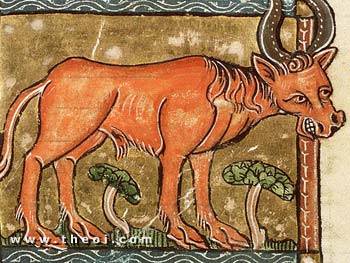TAUROS AITHIOPIKOS
Greek Name
Ταυρος
Αιθιοπικος
Ταυροι
Αιθιοπικοι
Transliteration
Tauros Aithiopikos
Tauroi Aithiopikoi
Roman Name
Tauri Aethiopicum
Sylvestres
Translation
Ethiopian Bull
Ethiopian Bulls

THE TAUROS AITHIOPIKOS (Ethiopian Bull) was a ferocious breed of carnivorous bull native to Aithiopia (Ethiopia) in sub-Saharan Africa. Its thick, red hide was impervious to weapons.
The bull was probably derived from ancient travellers' accounts of the African buffalo.
CLASSICAL LITERATURE QUOTES
Aelian, On Animals 17. 45 (trans. Scholfield) (Greek natural history C2nd A.D.)
:
"It seems that those Aithiopian (Ethiopian) Bulls which they call ‘flesh-eaters’ are the most
savage of animals. They are twice the size of Bulls in Greece, and their speed is very great. Their hair is red,
their eyes blue-grey, more so than the eyes of lions. In normal times they move their horns as they do their
ears, but when fighting they raise them, making them stand strongly up, and so do battle; and once raised in
passion owing to some truly wonderful natural cause their horns do not go aslant. No spear, no arrow can wound
them: iron, you see, does not penetrate their hide, for the Bull raises its bristles and throws off the weapons
showered upon it in vain. And it attacks herds of horses and also wild animals. Accordingly herdsmen who wish to
protect their flocks dig deep concealed ditches and by these means ambush the Bulls. And when they fall into
these ditches they are choked with rage. Among the Troglodytoi (Troglodytes, Cave-Dwellers) this is judged to be
the king of beasts, and rightly so, for it possesses the courage of a lion, the speed of a horse, the strength
of a bull, and is stronger than iron."
Pliny the Elder, Natural History 8. 74 (trans. Rackham) (Roman encyclopedia C1st
A.D.) :
"Aethiopia (Ethiopia) produces . . . many monstrosities : . . . But its fiercest animals are the Forest
Bulls (Tauri Silvestres), larger than the bulls of the field, surpassing all in speed, of a tawny
colour, with blue eyes, hair turned backward, mouth gaping open to the ears, along with mobile horns; the hide
has the hardness of flint, rejecting every wound. They hunt all wild animals, but themselves can only be caught
in pits, and when caught always die game."
SOURCES
GREEK
- Aelian, On Animals - Greek Natural History C2nd - 3rd A.D.
ROMAN
- Pliny the Elder, Natural History - Latin Encyclopedia C1st A.D.
BIBLIOGRAPHY
A complete bibliography of the translations quoted on this page.